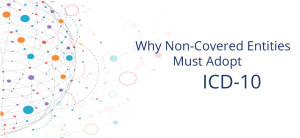 The switch to ICD-10 is mandatory for organizations covered by the Health Insurance Portability and Accountability Act (HIPAA), known as “HIPAA-covered entities.” Organizations not covered by the HIPAA, or “non-covered entities,” are not required to transition to ICD-10, but are strongly encouraged to do so. Non-covered entities include property and casualty insurance carriers, including auto insurers and workers’ compensation plans. Since property and casualty insurers are governed by state law rather than federal regulations, they are not subject to the federal ICD-10 mandate. However, non-alignment of state and federal reporting mandates will have a significant adverse impact on the healthcare industry. It is crucial for all organizations involved in healthcare transactions to comply with the federal ICD-10 standard in order to avoid significant industry disruption, excessive administrative burden, and negative impacts on quality of care.
The switch to ICD-10 is mandatory for organizations covered by the Health Insurance Portability and Accountability Act (HIPAA), known as “HIPAA-covered entities.” Organizations not covered by the HIPAA, or “non-covered entities,” are not required to transition to ICD-10, but are strongly encouraged to do so. Non-covered entities include property and casualty insurance carriers, including auto insurers and workers’ compensation plans. Since property and casualty insurers are governed by state law rather than federal regulations, they are not subject to the federal ICD-10 mandate. However, non-alignment of state and federal reporting mandates will have a significant adverse impact on the healthcare industry. It is crucial for all organizations involved in healthcare transactions to comply with the federal ICD-10 standard in order to avoid significant industry disruption, excessive administrative burden, and negative impacts on quality of care.
Being required to report ICD-9 codes to non-covered entities when the rest of the healthcare industry has transitioned to ICD-10 is extremely costly and burdensome for healthcare providers, requiring extensive manual labor and re-work. Systems may not be designed to capture and maintain ICD-9 and ICD-10 codes simultaneously, for the same dates of service, requiring complex and costly systems changes that are impractical or not even feasible. Providers may have to resort to manual administrative processes, claims processing delays or errors may occur, and coordination of benefits will be more challenging and error-prone. For some providers, it may be too cost-prohibitive or unworkable to manage simultaneous ICD-9 and ICD-10 reporting systems and processes.
The administrative simplification goals of reduced healthcare costs and increased administrative efficiencies are negated if adopted standards are not truly universal. There is significant cross-over in coverage for health to property and casualty, and the ability for all systems to speak the same language is advantageous in healthcare administrative functions as well as patient care. Data standardization enables the ability to compare date within and across industries – providing quality and efficiency measurements that may lead to higher quality medical care and decrease administrative costs.
ICD-9 codes will no longer be maintained, and therefore the ICD-9 code set will become even more obsolete than it is already. ICD-9 codes will become less useful and ICD-9 resources will be increasingly harder to obtain. Coders will no longer be trained to assign ICD-9 codes, resulting in a declining coder workforce skilled in using the ICD-9 code set. As time passes and coders become more proficient in ICD-10 and holdover ICD-9 claims for dates of service prior to October 1, 2015 dwindle and become a thing of the past, providers will be less likely to maintain a high ICD-9 skill level.
The Centers for Medicare & Medicaid Services (CMS) have indicated that although non-covered entities are not required to transition to ICD-10, the benefits of adoption outweigh the challenges. CMS, the Workgroup for Electronic Data Interchange (WEDI), and the International Association of Industrial Accident Boards and Commissions (IAIABC) have all cited benefits to non-covered entities of transitioning to ICD-10. These benefits include:
- Much greater diagnostic specificity and accuracy;
- Expanded detail in injury codes, which will be useful in evaluation of accident and injury claims;
- Provides an opportunity for greater measurement of the quality and efficacy of medical care;
- Facilitates research, including outcomes studies;
- Aids in policy setting;
- Improvements in financial and administrative performance;
- Facilitates claim filing for coordination of benefits;
- Detection and prevention of fraud and abuse;
- Aids in the development of fee schedule and pricing schemes;
- Helps in managing the utilization review process;
- Tracking risk to employees;
- Streamlining of patient care;
- Facilitates coordination of benefits;
- Alignment with industry standards;
- Greater administrative efficiencies.
An article previously published by the American Health Information Management Association also described benefits of the ICD-10 transition for non-covered entities.
WEDI identified 5 ICD-10 state readiness scenarios and recently posted an updated ICD-10 State Workers’ Compensation Readiness List. Unless states take action to align with the federal ICD-10 mandate, providers will be faced with conflicting and onerous reporting requirements. Providers in those states that have not adopted ICD-10 regulations with an effective date of October 1, 2015 are urged to advocate for state adoption of ICD-10. In the meantime, providers who are faced with conducting transactions with non-covered entities still using the ICD-9 code set on October 1 will need to develop contingency plans to ensure they are able to submit claims to these organizations.
This article was originally published on Coalition for ICD-10.
